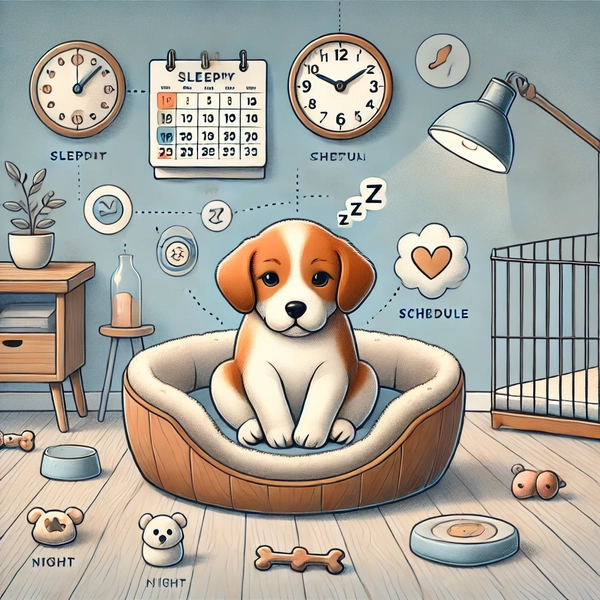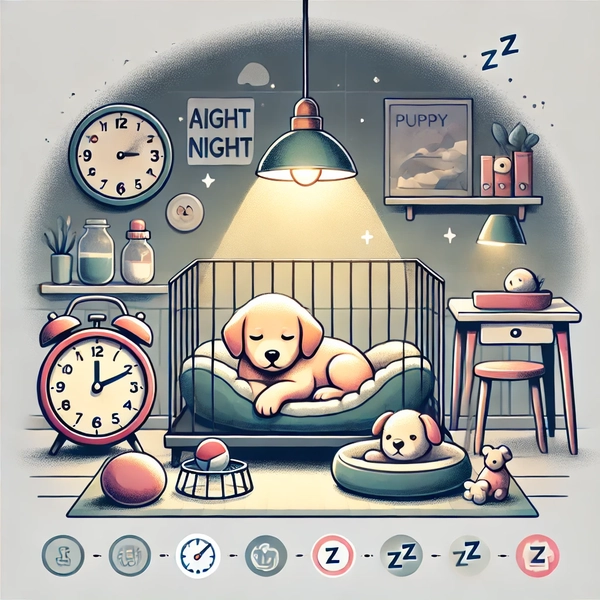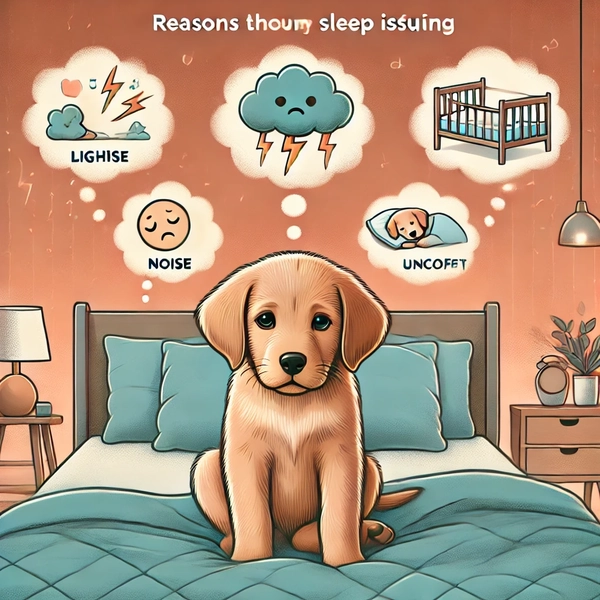Puppy Sleep Schedule by Age: A new puppy parent should follow and maintain a daily routine for the health of their puppy. A puppy’s daily routine must include a schedule for breeding, walking, and playing but sleeping even more.
This is because puppies are experiencing very active growth in their bodies, and thus, they require plenty of sleep.
Behavioral and even physical problems exist for a puppy that does not get enough sleep. Next, let us delve into the length of puppies, how long they sleep on average per age, and also why such a schedule is.
Why puppies need a lot of sleep

Puppies increase in size quite rapidly. They make as much progress in one year as a human will in eighteen years.
Sleep is necessary for the growing bones and muscles to develop psychologically and physically.
They develop physiologically as well during the rest period when they sleep. Puppies sleep so much mainly because of the following reasons:
- Body Development: All their bones, muscles, and organs must grow and mature for them to be applied.
- Brain Development: Skill acquisition and behavior change, especially in young children, correlate with the rapid growth of their systems and the brain.
- Energy Restoration: Puppies are active and playful while awake but prefer rest between play sessions.
Note: Stress-inducing situations arise from the subjected to insufficient sleep effects, which include stress, anxiety, agitated behavior as well as aggressiveness, among others.
How much sleep do puppies need?
The American Kennel Club (AKC) argues that puppies aged 8-12 weeks need an average of 18-20 hours of sleep every day.
Most of these puppies are brought into new homes at this age, hence the extra sleep needed to help them settle into the new environment.
However, as the puppies grow older, the number of hours they sleep gradually declines. Up to a point:
Puppy Sleep Schedule by Age: New Owner’s Guide
| Age | Hours of Sleep |
| 8-12 weeks | 18-20 hours |
| 12-16 weeks | 16-18 hours |
| 4-6 months | 14-16 hours |
| 6+ months | 13-15 hours |
Note: At 8 weeks old, puppies are only awake for 4-6 hours in a day. This time frame is spent between sleeping, eating, and exploring before the puppy goes back to sleep.
How to create a sleep schedule for a puppy

The Puppy Sleep Schedule is a framework to ensure that the puppy adapts to the family environment and acquires appropriate behaviors. This is how it can be done:
Mark Night Sleep Hours
A good percentage of puppies aged 7 – 16 weeks can stay asleep at night for 6 – 8 hours or even longer, depending on the situation.
However, this also includes potty breaks if the dog awakens. If the dog gets up from sleep in the night, it is most likely to use the bathroom, so do not tempt the dog with other forms of activity like play.
Schedule Nap Times
The remaining portion of the puppy’s sleep will come from daytime naps. Eight weeks puppies require around 5 naps, but relatively older ones may require less than that:
- 5 Naps: 8 Weeks
- 4 Naps: 12 Weeks
- 3 Naps or Less: 16 Weeks and Older
Include Sets of Activities That Are Done Daily In One’s Day
Dogs are also very much routine animals. Teaching your puppy to Quiet at certain hours for activities such as feeding, taking walks, sleeping, or any other will help them understand the time to play and when to sleep.
Sample Schedule For A 12 Week Old Puppy
| Time | Activity |
| 7:00 AM | Wake up and potty |
| 7:15 AM | Breakfast |
| 8:00 AM | Playtime |
| 9:00 AM | Nap |
| 11:00 AM | Potty break and play |
| 12:00 PM | Lunch |
| 1:00 PM | Nap |
| 3:00 PM | Potty break |
| 4:00 PM | Play and training |
| 6:00 PM | Dinner |
| 7:00 PM | Evening walk |
| 8:00 PM | Quiet time/bedtime |
Caution: Change this timetable by the level of activities your puppy engages in
Tips for ensuring that a puppy sleeps all night long

Your new puppy may not sleep through the night right away, but it is possible to encourage them to do so.
- Set a Routine: This is helpful for puppies as they adapt to their owner’s way of life. Set a bedtime for them. This rule should also be practiced during the holidays and weekends.
- Noise and Disturbance Should Be Kept To a Minimum: Arrange a conducive environment for the puppy where calm and warm conditions are maintained. This can be a crate or a bed placed in a corner away from all activity. Consider having a Snuggle Bed or similar bedding.
- Make Them Active in the Day: Puppies should be worn out by playing and being active during the day so they can easily sleep at night. In addition, they have to be mentally worn out. Therefore, suggest active toys so that the puppy can get bored of its vivid imagination instead of chewing up furniture.
- Keep Nighttime Calm: If the puppy gets up during the night to relieve himself, make that a quick affair with as little disturbance as possible. Shun any kinds of play fetch or treats, as they only energize them. Just take them out; they will finish their work and go straight to bed.
Reasons Why Puppies Have Difficulties Sleeping

At times, new puppy parents imagine their pet is oversleeping and tend to interrupt their rest for play activities.
Others believe that rousing their pet from slumber will ensure that the pet sleeps well at night. This is false and may prove counterproductive in the growth of your puppy. Here’s why:
- Decreased Growth: Awakening puppies shortens their growth cycle. The body and mind require sleep without interruption for proper development.
- Anxiety: Puppies who do not receive enough rest tend to learn new commands, become aggressive, or develop anxiety when awake.
Recommendation: Always permit your puppy to sleep for as long as necessary. He or she will eventually wake up on his or her own when it is time to eat, play, or go out.
Daily Routine for a Puppy
When puppies are given daily practice, they can cope and even flourish. Below is a sample of what might be suggested for a three-month-old puppy.
| Time | Activity |
| 7:00 AM | Wake up and potty break |
| 7:30 AM | Breakfast |
| 8:00 AM | Play and training |
| 9:00 AM | Nap |
| 10:30 AM | Short walk and play |
| 12:00 PM | Lunch |
| 1:00 PM | Nap |
| 2:30 PM | Training session |
| 4:00 PM | Afternoon walk |
| 6:00 PM | Dinner |
| 7:00 PM | Quiet time |
| 8:00 PM | Bedtime routine |
Note: Implement changes to times and activities based on the behavior and necessities of your puppy.
Quick Tips On How To Have Healthy Sleep Schedules For Puppies
- Avoid missing naps: Naps are equally as important as sleep at night.
- Always feed and play at certain times: This creates an order with a purpose.
- Avoid waking them up unless there is a task: Cuddly young ones should be allowed complete sleep.
FAQS
Over what duration can a puppy be left to sleep during the night?
Puppies between the ages of 7 and 16 weeks are likely to sleep without waking up for 6 to 8 hours but may ask for a bathroom break.
Can I wake up my puppy for some playtime?
It is not advisable, as there is a particular time for waking the pup without it being stress-free. In some cases, it is not recommended to allow a pup to sleep.
Why is it that my puppy only naps all day?
Puppies are said to sleep up to twenty hours for normal development. It’s therefore not abnormal for them to sleep the better of the day.
What should I do when my puppy refuses to sleep at night?
Give them enough daytime exercise and create a suitable environment for sleep. Their potty breaks should be less frequent.
What steps do I need to take if I want to change the sleeping times of my puppy?
Ensure a diet and sleeping time routine, and avoid excessive playing time before bed.
Conclusion
It is essential that you create a sleep schedule for your puppy, as this determines its growth and behavior. Dogs that are contented and live in a well-organized and set routine grow.
Always keep their surroundings quiet and peaceful, follow the regimen, and allow them to sleep their fill. This will guarantee that all family members, including your pet, will sleep well at night and be active the next day!